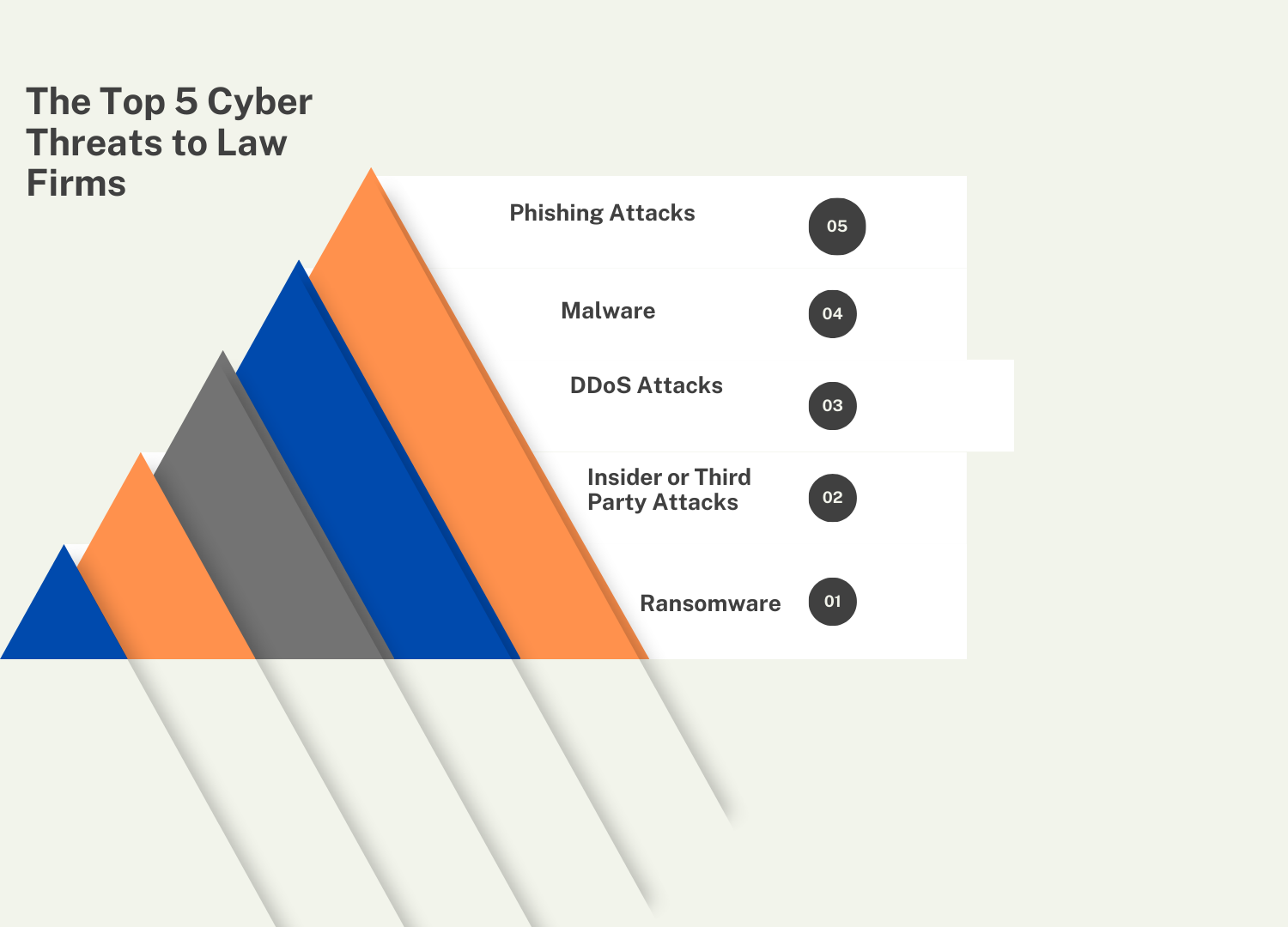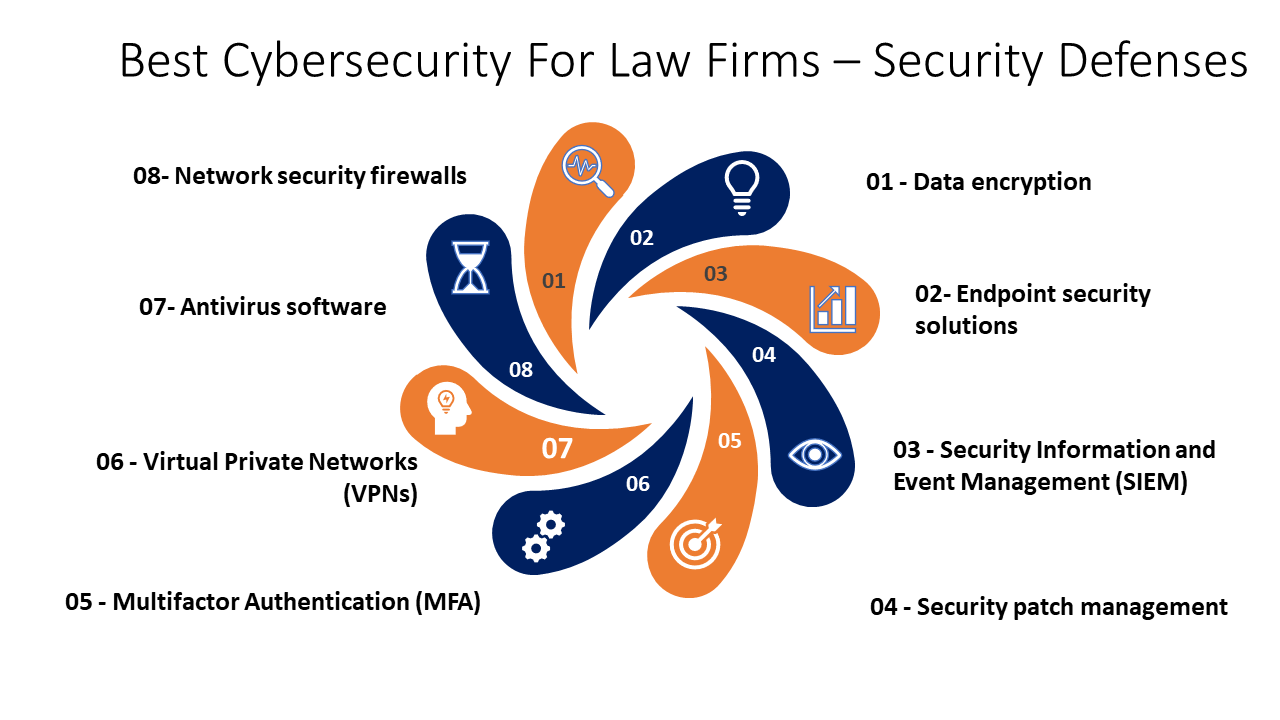Table of Contents
Various law firms have prioritized the safety of their client’s sensitive information, especially when we consider the current dangers that law firms face worldwide. A security breach affected 27% of legal firms in 2022 compared to 25% in 2021. In such a scenario, cybersecurity for law firms is necessary to protect the company’s information. Hence, reputations are a must-complete awareness among legal professionals amidst the proliferation of associated dangers.
This guide will take law firms through all the areas of cybersecurity practices that a legal technology solution provider should adhere to. It includes securing confidential client files, preventing data breaches, and ensuring compliance with industry rules. This section goes even deeper on best practices and practical tactics, pointing out subjects like the implementation of robust encryption protocols and training personnel on how to identify and mitigate cyber hazards.
These recommendations would enable law firms to substantially enhance their defenses against cyber-attacks and further secure clients’ sensitive information. Stay ahead of everyone and make sure your company is already ready to face whatever cyber attack they encounter. Stop postponing the fortification of your cybersecurity for law firms’ measures until it is too late; act now.
Legal Industry – A Target of Cybercrime
What makes the legal sector such an ideal target for cybercrime? US law firms are generally in a position to guard very private, sensitive, and personally identifiable information, which places them in a prime spot to be targeted by cybercriminals. Here’s why fraudsters find especially general attractiveness in law firms. In the first place, let’s consider some of the most important reasons why the legal cybersecurity must be added at all costs:
Rich Information
USA law firms retain a vast array of very rich information. Cybercriminals are interested in this information for different reasons, such as insider trading, an information advantage in court battles, and court manipulation. A threat actor was provided access to close to 184,000 files containing “private and privileged financial and legal documents, contracts, non-disclosure agreements, financial deals, and files relating to high-profile acquisitions”, states a report by global law firm Proskauer Rose, in April 2023.
Business Interruption
Legal firms face several financial losses arising from the interruption of their regular business. Cyber attacks cause disruptions by leading to lost billable hours and potentially causing financial harm to clients who need timely legal services. Legal processes thus become a very attractive target for ransomware gangs whose business models depend on demanding money in return for their restoring information technology services.
Financial Transactions
US law firms have huge financial transactions spanning many legal disciplines, such as mergers and acquisitions, and conveyancing, among others. Since these transactions are time-bound, they open up an atmosphere that is conducive to phishing attempts and penetration of business email accounts. This is because the hackers are trying to intercept funds while they are en route.

Importance of Cyber Security in Legal Practices
Since the information age hit, law firms were given the most monumental tasks of all: safeguarding the privileged information of highly valued clients—an element that cybercriminals very avidly pursue—such as confidential client files and financial records, intellectual property, and trade secrets. With such information, a gold mine of information is held within the law firms which is one of the main reasons for implementing cybersecurity for law firms. In the event of a data breach, the impact will be quite adverse, not only on the customers of the law firm; it also on the law firm itself.
There could easily be massive dents in the confidence of the public, damage to reputation, or prosecution by law arising in the event of a data breach. With the ability to be extremely damaging to the very bedrock of a law firm’s relationship with its clients, a cyber attack poses a significant threat to an industry that is built on the twin pillars of trust and confidentiality. The average cost of a data breach in the legal profession tops over $5 million by incident, meaning the financial impact of cybersecurity risks could potentially be astounding. Apart from this, the monetary cost of a breach can also be huge, the implications might likewise extend to future lost business and legal action which may come on top of regulatory penalties.
What Law Firms Need to Do?
The very first thing that law firms need to do to protect themselves along their clients is to realize the strict relevance of cybersecurity for law firms. Comprehensive cyber security tools and software can protect their digital assets, preserve faith and trust with clients, and guarantee industry rules are not infringed upon. Given that cyber threats continue to evolve, cybersecurity for law firms is no longer considered a mere good practice for any law firm seeking to endure the modern digital era. It is a key to success for law businesses.
Benefits of Investing in Cybersecurity Measures for Law Firms
The number of cases that have a connection with data leakage is increasing exponentially. With increasingly evolving cybersecurity risks, law firms are now, more than ever, under obligation to pay close attention to matters of cybersecurity. For businesses dealing with confidential client information every day, a data breach can lead to some disastrous consequences. Think about what could happen if a hacker accesses confidential customer information. That could lead to identity theft, financial loss, destroyed legal reputation, and more for your client. It’s not just financial loss; it ruins the confidence of your customers in your company. Rebuilding that customer trust, if possible, can take years.
In 2016, hackers leaked nearly 11.5 million confidential documents from Panamanian law firm Mossack Fonseca. This leak exposed the private financial information of politicians, celebrities, and businesspeople around the world. It damages their reputations and potentially opens them up to legal consequences.
Fortunately, law firms can avoid such situations by adopting the following cybersecurity practices. Check the most crucial ways that cybersecurity for law firms can improve the security of their data.
Ways to Improve Cybersecurity of Your Law Firm
By enhancing cybersecurity for law firms, you can protect not only your clients’ data but also any confidential business information that may concern your firm. Here are five ways through which you can enhance the internet security of your legal practice.
1. Use Password Managers
A good majority of data privacy law firms make the error of using the same passwords for a variety of different systems. This, in turn, makes it easier for hackers to gain access to several accounts with just one purloined password. Password managers help in this case when they record and can generate quite safe passwords, different for each account. Thus, in case of a breach of one part of the system, you will not risk your entire system. They help the user to manage all logins safely without remembering each one individually.
2. Run Updates on Software and Computers Regularly
Keep the installation of your software and your operating systems really up to date. Most software businesses periodically release updates and patches as some form of nipping cybersecurity threats in the bud before hackers get the opportunity to squeeze through them. In essence, you are patching up possible security gaps in your software each time you update it. Thus, this decreases the chances of compromise of your information.
This is of paramount consideration about operating systems, whether you are using a computer that runs Windows, Apple, or even Android. You can set your computer to allow for automatic updating, generally overnight. Mobile devices, such as smartphones and tablets, also prompt users to update when a new patch is released for distribution.
The same applies to you if you utilize anti-virus software. Programs offering you antivirus protection will notify you constantly regarding various malware that have been blocked, and they will also advise you when important updates should be downloaded and installed.
3. Install an encryption data system
Data encryption is a process that converts information into some sort of code. This serves a very good purpose. Accessing the information on the device would be impossible without the right decryption key, even if it were taken. This makes using some form of encryption practice very important for stored and transit data within US law firms. This can be achieved by encrypting the files on your computers and making sure that any emails or correspondence containing confidential information are first sent via a secure server. Some mobile phones and other electronic devices are designed to have inbuilt encryption, while some even have an added option that allows erasing data remotely if the item gets lost/stolen.
4. Use Secure Cloud Storage Service
For the sake of convenience, a greater part of cybersecurity for law firms stores their data in the cloud; however, this demands very tight security measures. While picking cloud services, choose those that employ encryption and comply with regulatory requirements such as HIPAA. With this in mind, the information belonging to your clients is saved.
5. Utilize two-factor authentication
Two-factor authentication strengthens account security by requiring users to provide two distinct verification methods before granting access. Two-factor authentication (or MFA) typically relies on two things you control: something you know (a password) and something you possess (like a code sent to your phone). Despite the password they may have, there are chances of cyberattacks in law firms. All large internet services—email providers and software used to manage law firms, in particular—have 2FA. Customize it, and you’ll block illicit access and get an instant notification if someone logs in from a device you don’t recognize.
6. Responding and recovering from a cyber security breach
Even with the best security controls in place, no organization can be completely secure. With cyberattacks in law firms increasing the possibility of experiencing a data breach or security incident is also rising. On these grounds, a law firm has to be ready and capable of quickly and suitably responding in case of an event. Through this way, they will be able to reduce the extent of impact the incident might cause on their operations and the client base as well.
Companies should develop an incident response plan to prepare for the steps they will undertake if there is a breach. It can, in general, set forth procedures that should be taken, the roles, and duties of key persons, and communication protocols that shall be followed. This is important to effectively educate clients, regulators, or any other stakeholders. The incident response plan must likewise be regularly exercised and updated so that the company is prepared to respond to almost any kind of cybersecurity threat.
Recovery and continuation of operations should be the focus of any law firm after a breach has taken place. This could include restoring the data, getting it back from safe backups that may be encrypted or otherwise affected, executing workarounds to install temporary measures that help retain vital operations, and implementing security features to help block future events. Moreover, organizations must conduct thorough investigations in pursuit of the root cause of a breach that could better enable them to find holes in their security measures that need some fine-tuning.
7. Cyber security training for staff members
Most of the cyberattacks in law firms normally rely on the employee as the first line of defense. They can either kill or maintain a law firm’s cyber security position based on their level of awareness and alertness. Proper and continual training should be provided for all employees. Especially on why cyber security is important and their role in protecting the company’s digital assets.
The course should contain a wide variety of topics related to the identification of common cyber threats, such as malware, phishing, and social engineering schemes. This would not only identify any warning signs within one’s work but also give knowledge of the correct action to take in case they occur.
Training on best cybersecurity practices in secure data management has to focus on password management, secure file sharing, proper use of encryption, and other factors related to threat awareness. Staff members should know the policies and procedures that the company has concerning cyber security in general, and about the critical roles each one of them has to contribute to the maintenance of privacy, availability, and integrity of customer data.

Future of Cybersecurity for Legal Practices
Predictions of new arising cyber threats and creations of new technologies
Law firms’ cybersecurity environment is expected to undergo continuous change as cyber threats are anticipated to emerge. Predictive analytics, AI, and machine learning methodologies will be central in the identification of possible vulnerabilities and the prevention of attacks before they occur. Deep learning techniques and AI systems, for example, can consider patterns derived from past breaches to predict future attacks and hence act in advance by putting safeguards in place. Internet of Things devices are rapidly becoming a part of the office environment. IoT will contribute to a range of new risks that legal firms will need to take measures to manage.
Future Challenges of Cybersecurity
The time is tough but remaining competitive through this is very important. Legal firms need to invest in cutting-edge technology and continue evolving law firm cybersecurity compliance. This will not only call for new security solutions but also the review of some existing policies and practices. Innovations like blockchain, which makes transactions safe and tamper-proof, and smart contracts can be useful to improve data integrity and confidentiality. To a large extent, the greater the acceptance of artificial intelligence into the legal system, the more imperative it is for law firms to secure AI systems against manipulation to ensure that they are rightly and securely used ethically.
For the protection of the law firm, and therefore the clients, from such threats in the future, cybersecurity for law firms will always be very important to keep themselves up-to-date with the trends of cybercrime activities and adjust their measures of cyber security. If law firms are ready to improve upon and meet such challenges, then it will be possible for them to continue being resilient and preservative of clients’ trust in an ever-digitizing world.
Conclusion
Provided that cybersecurity for law firms is preparing for such improvements and challenges, it would then be possible for them to be consistently resilient and preservative of client trust in an ever-digitizing world. What is needed at this point is a holistic approach that goes beyond just adopting cybersecurity for law firms to be safely positioned given the present threat scenario. Moreover, the lawyers have to develop a culture of cyber security knowledge with accountability to ensure complete protection of the companies and clients handling their cases.
This has to begin at the very top, with the leadership of the company, demonstrating a real commitment to cyber security and empowering the staff to make it a top priority in setting expectations for the remainder of the organization. Cybersecurity for law firms has to be embedded within the strategic planning process of the company, defining goals, KPIs, and accountability measures to track progress toward continuous improvements targeted.
For a cultural sense of cyber security to be infused, there is a need for continuous education and training from the simplest to the partner level across all administrative personnel. By giving employees information and skills to identify and mitigate cyber security threats, law firms can create an enterprise-wide resilient and proactive defense against a fast-changing digital panoramic view of the dangers.
Ultimately, cybersecurity for law firms in this digital world is not a technological problem. It’s a cultural challenge and need of the hour. A solid foundation for cyber security awareness, best practices, and response abilities is the key. It provides legal professionals a way to protect their firms, clients, and the profession itself in the long term.
Frequently Asked Questions
Where is the cybersecurity industry on a scale considering its future?
The future of cybersecurity is in alignment with quantum computing since these will be capable of protecting and exploiting data. Cybersecurity relies on the difficulty of certain problems for classical computers, enabling secure information storage.
What is the core reason behind implementing cyber security?
Data protection is close to being one of the most important factors in cyber security because, in this day and age, where practically everyone suffers from the case of identity theft and data breach, there is such a huge number of them. People will always find ways for the protection and security of their personal information.
Is Cybersecurity and Data protection the same?
Security, when associated with personal data, refers to information that identifies a person, like name, email address, date of birth, national insurance number, bank account number, sort code, medical records, photo, video, or audio recording. Data protection ensures that personal data are secure, while cybersecurity is broad and enjoins all forms of information, be it sensitive commercial data or private data. Cybersecurity also incorporates data storage, transmission, and retention with security measures as the data is in a state of motion either on a server or hard disk.
Why are strategies that ensure cyber security essentially important?
Designing a cyber security strategy will help better understand your current environment and profile. Hence, you will know where you are positioned compared to your organization. You can realize your weaknesses and vulnerabilities and thus make adjustments that will take you to your destination.






